ITB Hospitality-Talk: Everybody wants expansion, but with different concepts
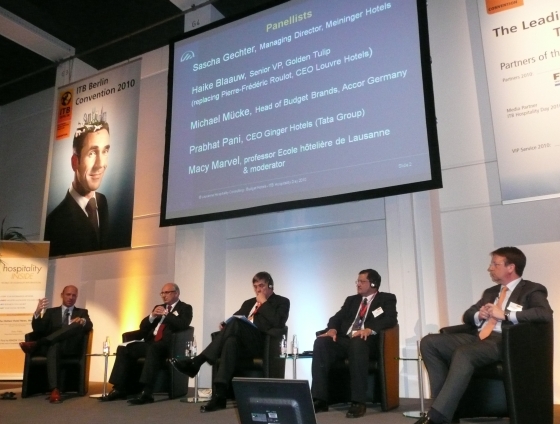 |
|
| Budget everywhere - the international panel during the 5th ITB Hospitality Day. |
Berlin (April 2, 2010). Whether China, India, South America or Europe: the pipeline of budget hotels is as international as ever. European providers conclude cross-continent joint ventures. In India, a national brand is storming the market. The panel round about the global budget hospitality at the fifth “ITB Hospitality Day”, the ITB hotel conference, made experts take notice.
You did not have to go far in order to witness the advance of budget hotels with your own eyes, said moderator Macy Marvel, Professor of Economics at the Lausanne Hotel Management School, introducing the discussion in Berlin. The German capital was a paradise for price-conscious travellers. Average daily costs amounted to 108 euros, and you got a bed in a hostel from 19 euros upwards. And for only 25 euros you got a single room in Berlin’s new easyHotel.
While the budget boom has been smiled at as a phenomenon of the economic crisis the potential of which has been overrated in Germany, more and more international developers and chains have been following Accor, the budget market leader, trusting in priceworthy hotels with reduced service.
Accordingly, the Louvre Hotels Group, which counts 782 budget hotels belonging to the brands of Prèmiere Classe, Campanile, Kyriad, Kyriad Prestige, and Golden Tulip, already announced expansion outside France as early as in 2005. In 2007, the group signed a joint venture with Warimpex from Austria on the development of Prèmiere Classe and Campanile in Eastern Europe.
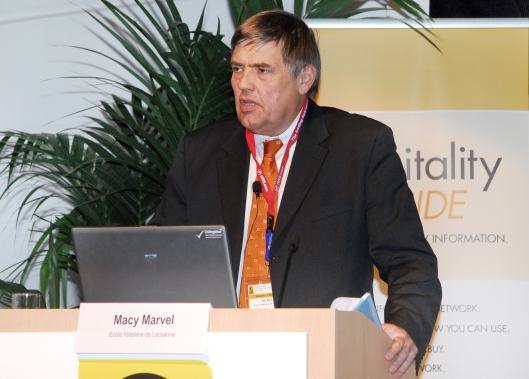 |
|
| Moderator Prof Macy Marvel. |
“So far,” said Haike Blauuw, Senior Vice President Golden Tulip and representative of Louvre, “we have signed for six hotels in Poland and a single hotel in Budapest.” Furthermore, there was an agreement on 15 hotels in Morocco.
Louvre drives expansion via joint ventures
Outside Europe, the company planned several additional joint ventures, such as in China and Brazil. Apart from that, the United Arab Emirates and Japan were on the group’s agenda for expansion. “We cannot tackle everything at once,” explained Blauuw showing some astonishment concerning the fact that competitors from Great Britain like Premier Inn and Travelodge have expanded very little outside the United Kingdom
Prahbat Pani, CEO of the Indian Ginger Hotels, proudly presented his brand in Berlin. The budget group is owned by the Indian Tata Group (including Taj Hotels). “We are the fastest growing brand in India with this brand,” explained Pani. “21 Ginger hotels are currently open; another five are under construction and nine more have been signed for.” According to Pani, the economic crisis has almost had no negative effects on these hotels. “We have a growing middle class taking long-distance trips as well,” stated Pani. 70 percent of Ginger’s guests were between 25 and 35 years of age – young managers or freelancers. They were even booking Ginger for weekend trips. “Our average rate is at 30 dollars, while standard rates range between 22 and 45 dollars,” said Pani.
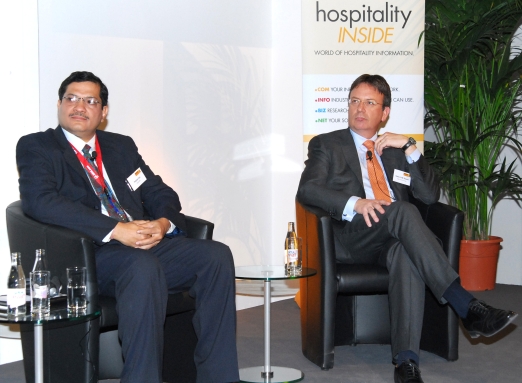 |
|
| Prabhat Pani (l.) und Haike Blauuw. / Fotos (4): map |
Indian budgets: Increasing costs due to F&B, but low wages
So far, Ginger Hotels have been located in business centres, not in big cities, but this will change in the next generation. “All other Indian brands belong to the upper market segments. Below them, there is just one single unorganised segment. Our competitors are guest houses or serviced apartments,” said Pani explaining why he thinks that it was not easy for international chains to fulfil the demands of his fellow countrymen in the budget segment. “In India, hotels need to serve hot food. India is like a small Europe. There are 30 different languages. If you drive 500 kilometres, you will experience completely different food. We have to take regional differences into account.” Currently, according to Pani, Ginger Hotels’ share of international guests amounts to 10 percent. At Ginger Hotels, Managers earn between 10,000 and 15,000 dollars per year, while first-time employees earn between 4,000 and 5,000 dollars per year throughout the industry. Macy Marvel commented this with the words: “This looks like a profitable business model...”
Even if human resources costs were much higher in Europe, the German Meininger Group has six additional hotels in its pipeline. They called their lodging houses hostels in the beginning, but they have been renamed hotels in the meantime. According to Managing Director Sascha Gechter, Meininger leases hotels via fixed lease agreements reducing the risk by way of their excellent location and the hotels’ hybrid model. In this way, they attracted various target groups. “30 percent of our guests at Berlin Central Station are business travellers,” explained Gechter.
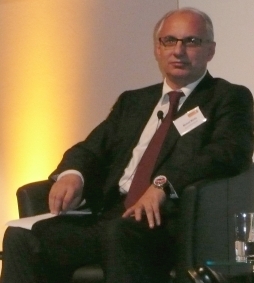 |
|
| Michael Muecke. |
Accor trusts in small hotels and micro locations
Accor also trusts in hybrid guests, but with another concept. While Meininger increasingly operates big hotels not shrinking back from 300 to 350 rooms, Accor offers up to three different brands at a single location. "Concerning our Economy brands, human touch will be playing a bigger part," emphasised Michael Muecke, Managing Director and Managing Director Economy Brands Accor Germany. "It is easier to realise in a hotel with 150 to 180 rooms." There are 11 Ibis Hotels in Berlin alone.
"Our model is risk management and proximity. We pick up the micro locations," explained Muecke. His company had always fared well with this. "We know the market, as we brought budget hotels back to Germany." However, Muecke was not entirely unconcerned with respect to the many new competitors: "But I''m sometimes surprised by the extremism in Germany myself," said Muecke concerning the nation-wide budget boom. "1,000 new rooms in Berlin and Hamburg in only 12 months is too fast. Despite significant perspectives, I expect more sense of proportion."
Muecke justified the fact that Accor''s Motel 6 subsidiary failed to benefit from the economic crisis in the US by hinting at their main target group. "Motel 6 primarily generates revenues from people working in the construction industry or in manufacturing in the US. European economy hotels are much more resistant. The share of individual leisure travellers has remained stable at Accor."
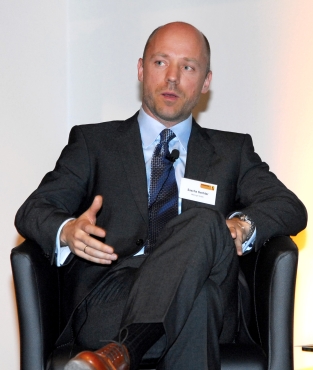 |
|
| Sascha Gechter. |
Keep things simple in future
According to experts, the future of the budget segment remains promising, as long as their most important features are not watered down. "We want to stay true to our core principles," said Gechter. Muecke thinks the same. "We need to stay simple instead of adding one additional offer after the next. They do not belong to economy hospitality. Their key to success is simplicity." However, said Muecke, all Etap Hotels were equipped with free-of-charge WLAN in 2009. According to Pani, Ginger also switched their WLAN provider in order to serve the new human basic need.
Furthermore, budget hotels no longer strive for price parity at all times. "Guests accept price differences of up to 100 percent," said Muecke. "We have given up on the appeal of a fixed system in favour of yielding." For 2010, Muecke reckons with more friendly signs on the horizon, and the first two months had been encouraging. According to Pani, Ginger Hotels had recorded a 10-percent revenue growth. Particularly occupancy had developed positively. The company had concluded more general agreements with other companies and was expecting good results in 2010 as well. / Susanne Stauss
March 26, 2010 Sit down and think - ITB Hospitality Day: Innovation panel pleading a mental restart
To print this article you have to be registered and logged in for newsletter, visitor or subscription.





